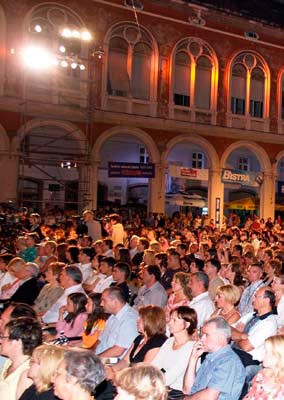Croatian Festival of Popular Music Split is a massive music project which requires about 300 000 Euros per year, so logically there are some people who are asking if the money provided really brings wanted results. But, even though there are many complaints that the Festival is losing its musical identity, there is no doubt that Croatian music scene would be much poorer without such manifestation...

Festival of Popular Music Split is the most prestigious music manifestation and the only festival in Croatia which had international character at the beginning of 60s and 70s. Many famous artists, such as Al Bano, Gino Paoli, Sergio Endrigo, Milva, Claudio Villa, The Shadows, Domenico Modugno, Marta Kubishova, Eva Pilarova and others, sang on the famous scene of Trg Republike (Prokurative) in Split. On the 4th and 5th of July, the Festival will reach its 48th edition – on the first evening, 15 Dalmatian klapas are going to sing old Festival hits a-capella, while the final evening is reserved for new compositions. Logically, it is the final evening that is most interesting to the numerous audience (both domestic and international) and it’s thanks to many famous artist and compositors who participate. This year they will be joined by famous Macedonian singer Kaliopi and famous Slovenian singer Alenka Gotar who represented Slovenia on Eurovision Song Contest an year ago.
Director of the Festival, compositor Tomislav Mrduljas, has invited biggest names of Croatian music scene, so on the final evening we will be able to see artists such as Doris Dragović, grupa Magazin, Giuliano, Danijela, Alka Vuica, Đani Maršan, Jasna Zlokić, Mladen Grdović and many others who will try to impress the audience with their new compositions.
This Festival, which is continuously held from 1960, is regularly covered by cameras of Croatian national television, so its popularity is based not just on beautiful songs, but also on support of the national television.
Festival of Popular Music Split is specific by its music expression. The organisers have always wanted to present Dalmatian, Croatian popular music which has Mediterranean elements. Even though the lead exapmle of Splitski Festival has always been Italian San Remo, Splitski Festival created and conserved its specific sound which can be best described as Croatian famous compositor Nikica Kalogjera used to describe it – as Adriasound, meaning of course, the sound of Adriatic. Kalogjera celebrated the colour and smells of Adriatic song not just on the stage of Splitski festival, but also on stages of many other international festivals. He was followed by other compositors, such as Zdenko Runjić. Unfortunately, they are both dead today.
Many recall some unforgettable songs which were sang on this Festival, which is trying to join together most modern elements of today’s music and traditional song – which is almost impossible. Today’s organization is trying to bring back the reputation this Festival once had. Much is talked about crisis of compositors in Croatia, but the reasons for this condition are much deeper. The only thing that has been tracking Festival’s fame through all these years is a stage. For several years there hasn’t been a hit from this Festival, even though during the last 3 years a movement has been made towards the sound of Dalmatian traditional music. How are things going to be this July? We’ll se. The proofs that tradition is very important to Split are this year’s winners of Prize for Extreme Contribution to Croatian Music Culture. This prestigious award will be given to singers Oliver Dragojević and Đorđi Peruzović and text writer Jakša Fiamengo. Oliver, who is 61 years old, is still most popular singer in Croatia while Đorđi, who is a bit older, is a veteran of Splitski Festival and was a participant of Lyra of Bratislava where he was awarded too. Fiamengo is the most productive text writer in Croatia – he is a famous poet and a member of Croatian Academy of Science and Art (HAZU).
Croatian Festival of Popular Music Split is a massive music project which requires about 300 000 Euros per year, so logically there are some people who are asking if the money provided really brings wanted results. But, even though there are many complaints that the Festival is losing its musical identity, there is no doubt that Croatian music scene would be much poorer without such manifestation.
Goran Pelaić
